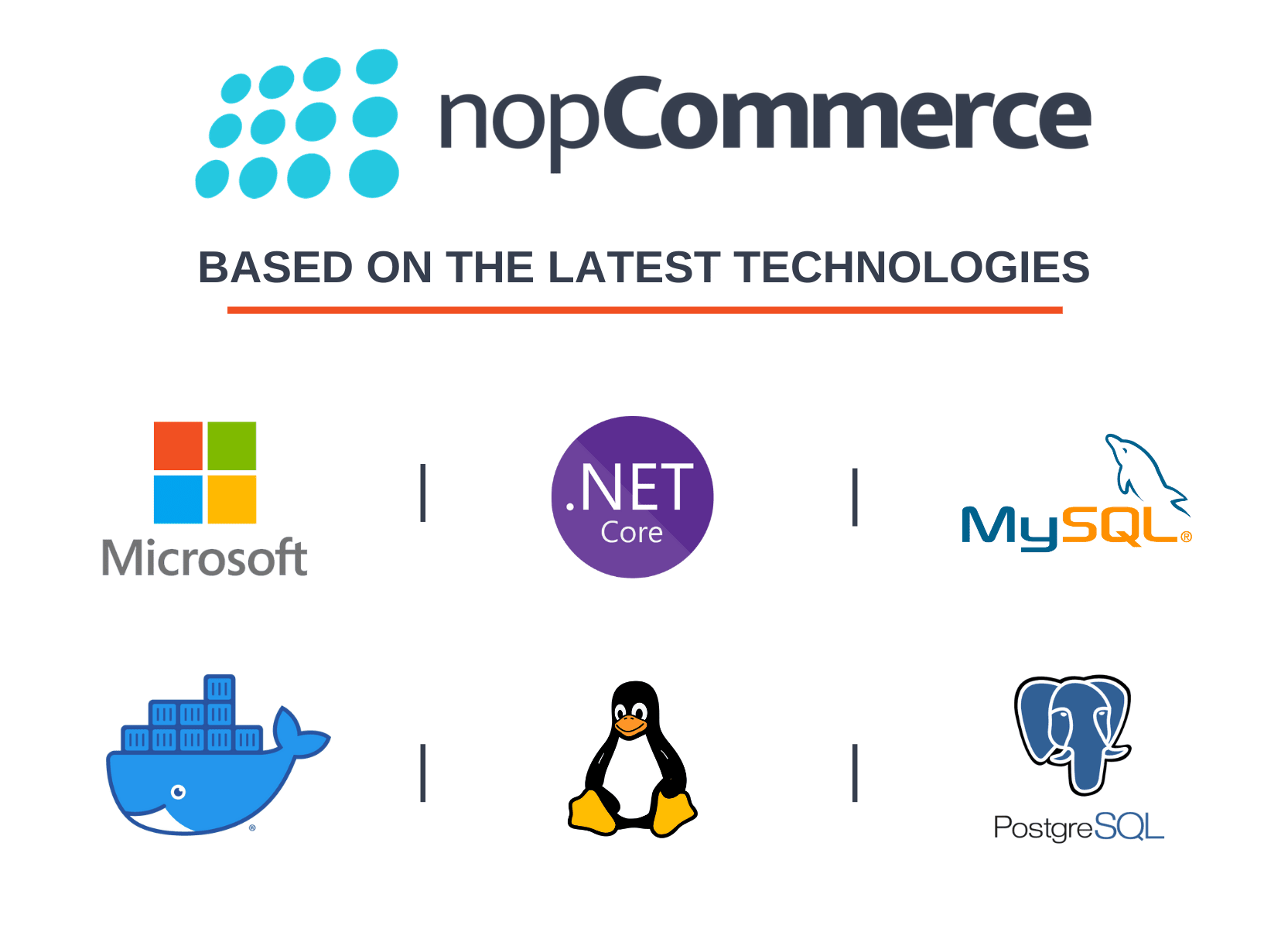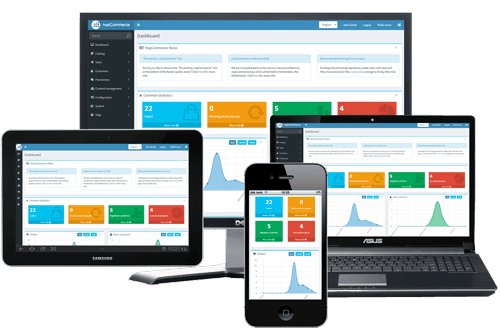 nopCommerce
nopCommerce
ASP.NET Core eCommerce software. nopCommerce is a free and open-source shopping cart.
Top Related Projects
A free shopping cart system. OpenCart is an open source PHP-based online e-commerce solution.
PrestaShop is the universal open-source software platform to build your e-commerce solution.
Prior to making any Submission(s), you must sign an Adobe Contributor License Agreement, available here at: https://opensource.adobe.com/cla.html. All Submissions you make to Adobe Inc. and its affiliates, assigns and subsidiaries (collectively “Adobe”) are subject to the terms of the Adobe Contributor License Agreement.
A customizable, open-source ecommerce platform built on WordPress. Build any commerce solution you can imagine.
An open source eCommerce platform giving you full control and customizability. Modular and API-first. Multi-vendor, multi-tenant, multi-store, multi-currency, multi-language. Built using Ruby on Rails. Developed by @vendo-dev
Shopware 6 is an open commerce platform based on Symfony Framework and Vue and supported by a worldwide community and more than 3.100 community extensions
Quick Overview
nopCommerce is a free, open-source e-commerce platform built on ASP.NET Core. It provides a flexible shopping cart and catalog system, allowing businesses to create and manage online stores with ease. nopCommerce offers a wide range of features and is highly customizable to suit various business needs.
Pros
- Highly customizable and extensible through plugins and themes
- Strong community support and regular updates
- Built on modern technology stack (ASP.NET Core)
- Comprehensive set of e-commerce features out of the box
Cons
- Steep learning curve for developers new to ASP.NET Core
- Performance can be an issue for large catalogs without proper optimization
- Limited built-in multi-vendor functionality
- Some advanced features require paid plugins
Code Examples
As nopCommerce is a full e-commerce platform rather than a code library, specific code examples are not applicable. However, developers can extend and customize the platform using C# and ASP.NET Core.
Getting Started
To get started with nopCommerce:
- Download the latest release from the official website.
- Extract the files to your local machine or web server.
- Set up a SQL Server database.
- Configure the connection string in the
appsettings.jsonfile. - Run the application and follow the installation wizard.
For development:
- Clone the repository:
git clone https://github.com/nopSolutions/nopCommerce.git - Open the solution in Visual Studio or your preferred IDE.
- Restore NuGet packages and build the solution.
- Set up the database and run the application.
Refer to the documentation for detailed instructions on development and customization.
Competitor Comparisons
A free shopping cart system. OpenCart is an open source PHP-based online e-commerce solution.
Pros of OpenCart
- Lighter weight and potentially faster performance
- Larger marketplace with more extensions and themes
- Simpler setup and configuration for basic stores
Cons of OpenCart
- Less robust out-of-the-box features compared to nopCommerce
- Smaller community and less frequent updates
- Limited built-in multi-store capabilities
Code Comparison
nopCommerce (C#):
public class Product : BaseEntity, ILocalizedEntity, ISlugSupported
{
public string Name { get; set; }
public string ShortDescription { get; set; }
public string FullDescription { get; set; }
public bool ShowOnHomepage { get; set; }
public string MetaKeywords { get; set; }
}
OpenCart (PHP):
class ModelCatalogProduct extends Model {
public function getProduct($product_id) {
$query = $this->db->query("SELECT DISTINCT * FROM " . DB_PREFIX . "product p LEFT JOIN " . DB_PREFIX . "product_description pd ON (p.product_id = pd.product_id) WHERE p.product_id = '" . (int)$product_id . "' AND pd.language_id = '" . (int)$this->config->get('config_language_id') . "'");
return $query->row;
}
}
The code comparison shows that nopCommerce uses a more object-oriented approach with C#, while OpenCart uses a more traditional PHP structure with direct database queries. nopCommerce's approach may be easier to maintain and extend for larger projects, while OpenCart's approach might be simpler for small to medium-sized stores.
PrestaShop is the universal open-source software platform to build your e-commerce solution.
Pros of PrestaShop
- Larger community and ecosystem with more themes and modules
- Better multilingual and multi-currency support out of the box
- More flexible and customizable front-end design
Cons of PrestaShop
- Steeper learning curve for developers new to the platform
- Can be resource-intensive, especially with many modules installed
- Less integrated approach to plugin development compared to nopCommerce
Code Comparison
PrestaShop (PHP):
class ProductController extends ModuleFrontController
{
public function initContent()
{
parent::initContent();
$this->setTemplate('module:mymodule/views/templates/front/product.tpl');
}
}
nopCommerce (C#):
public class ProductController : BasePublicController
{
public virtual IActionResult ProductDetails(int productId)
{
var product = _productService.GetProductById(productId);
return View(product);
}
}
Both platforms use MVC architecture, but PrestaShop relies on Smarty templates while nopCommerce uses Razor views. PrestaShop's controller structure is more tightly coupled with its module system, while nopCommerce follows a more standard ASP.NET Core approach.
Prior to making any Submission(s), you must sign an Adobe Contributor License Agreement, available here at: https://opensource.adobe.com/cla.html. All Submissions you make to Adobe Inc. and its affiliates, assigns and subsidiaries (collectively “Adobe”) are subject to the terms of the Adobe Contributor License Agreement.
Pros of Magento 2
- More extensive ecosystem with a larger community and marketplace
- Better suited for large-scale enterprise e-commerce solutions
- Advanced multi-store and multi-language capabilities
Cons of Magento 2
- Steeper learning curve and more complex architecture
- Higher resource requirements and potentially slower performance
- More expensive to implement and maintain
Code Comparison
nopCommerce (C#):
public class ProductController : BasePublicController
{
public virtual IActionResult ProductDetails(int productId, int updatecartitemid = 0)
{
var product = _productService.GetProductById(productId);
if (product == null || product.Deleted)
return InvokeHttp404();
Magento 2 (PHP):
class Product extends \Magento\Catalog\Controller\Product\View
{
public function execute()
{
$productId = (int)$this->getRequest()->getParam('id');
$product = $this->productRepository->getById($productId);
if (!$product->isVisibleInCatalog()) {
throw new NotFoundException(__('Product not found'));
Both platforms use MVC architecture, but nopCommerce is built on .NET Core while Magento 2 uses PHP. Magento 2's codebase is generally more complex and modular, reflecting its enterprise-level focus. nopCommerce tends to have a more straightforward approach, making it easier for developers to understand and modify.
A customizable, open-source ecommerce platform built on WordPress. Build any commerce solution you can imagine.
Pros of WooCommerce
- Larger community and ecosystem with more plugins and themes
- Easier integration with WordPress sites
- More user-friendly for non-technical store owners
Cons of WooCommerce
- Performance can be slower, especially for larger stores
- Less flexibility for custom development compared to nopCommerce
- Higher hosting requirements due to WordPress dependency
Code Comparison
WooCommerce (PHP):
add_action( 'woocommerce_before_main_content', 'woocommerce_output_content_wrapper', 10 );
add_action( 'woocommerce_after_main_content', 'woocommerce_output_content_wrapper_end', 10 );
nopCommerce (C#):
public override void Install()
{
_context.Locales.AddOrUpdate(x => x.ResourceName,
new LocaleStringResource { ResourceName = "Products.ProductName", ResourceValue = "Product name" });
}
WooCommerce uses WordPress hooks and actions for extensibility, while nopCommerce employs C# and .NET patterns for modular development. WooCommerce's code is more accessible to PHP developers familiar with WordPress, whereas nopCommerce requires .NET expertise but offers more robust architecture for complex e-commerce solutions.
An open source eCommerce platform giving you full control and customizability. Modular and API-first. Multi-vendor, multi-tenant, multi-store, multi-currency, multi-language. Built using Ruby on Rails. Developed by @vendo-dev
Pros of Spree
- Built on Ruby on Rails, offering a more flexible and customizable framework
- Extensive plugin ecosystem with many community-contributed extensions
- Better suited for larger, more complex e-commerce applications
Cons of Spree
- Steeper learning curve, especially for developers not familiar with Ruby
- Smaller community compared to nopCommerce, potentially leading to fewer resources and support options
- May require more development effort for basic setups compared to nopCommerce's out-of-the-box functionality
Code Comparison
nopCommerce (C#):
public class ProductController : BasePublicController
{
public virtual IActionResult ProductDetails(int productId, int updatecartitemid = 0)
{
var product = _productService.GetProductById(productId);
if (product == null || product.Deleted)
return InvokeHttp404();
}
}
Spree (Ruby):
class ProductsController < Spree::StoreController
def show
@product = Spree::Product.friendly.find(params[:id])
return unless @product
@variants = @product.variants_including_master.
spree_base_scopes.active(current_currency).
includes([:option_values, :images])
end
end
Both frameworks offer robust e-commerce solutions, but cater to different developer preferences and project requirements. nopCommerce provides a more straightforward approach with its .NET-based architecture, while Spree offers greater flexibility and customization options through Ruby on Rails.
Shopware 6 is an open commerce platform based on Symfony Framework and Vue and supported by a worldwide community and more than 3.100 community extensions
Pros of Shopware
- Built with modern PHP frameworks (Symfony) and technologies (Vue.js), offering a more up-to-date tech stack
- Extensive plugin ecosystem and marketplace, providing more out-of-the-box functionality
- Better suited for larger, enterprise-level e-commerce projects
Cons of Shopware
- Steeper learning curve due to its complex architecture and use of advanced technologies
- Less flexibility for customization compared to nopCommerce's open-source nature
- Higher resource requirements, potentially leading to increased hosting costs
Code Comparison
nopCommerce (C#):
public class ProductController : BasePublicController
{
public virtual IActionResult ProductDetails(int productId, int updatecartitemid = 0)
{
var product = _productService.GetProductById(productId);
if (product == null || product.Deleted)
return InvokeHttp404();
}
}
Shopware (PHP):
class ProductController extends StorefrontController
{
public function detail(Request $request, SalesChannelContext $context): Response
{
$page = $this->productPageLoader->load($request, $context);
return $this->renderStorefront('@Storefront/storefront/page/product-detail/index.html.twig', ['page' => $page]);
}
}
Both repositories offer robust e-commerce solutions, but Shopware is more suited for larger projects with its modern tech stack and extensive ecosystem. nopCommerce provides greater flexibility and easier customization, making it ideal for smaller to medium-sized businesses.
Convert  designs to code with AI
designs to code with AI

Introducing Visual Copilot: A new AI model to turn Figma designs to high quality code using your components.
Try Visual CopilotREADME
nopCommerce: free and open-source eCommerce solution
nopCommerce is the best open-source eCommerce platform. nopCommerce is free, and it is the most popular ASP.NET Core shopping cart.

Key features
- The product is being developed and supported by the professional team since 2008.
- nopCommerce has been downloaded more than 3,000,000 times.
- The active developer community has more than 250,000 members.
- nopCommerce runs on .NET 9 with an MS SQL 2012 (or higher) backend database.
- nopCommerce is cross-platform, and you can run it on Windows, Linux, or Mac.
- nopCommerce supports Docker out of the box, so you can easily run nopCommerce on a Linux machine.
- nopCommerce supports PostgreSQL and MySQL databases.
- nopCommerce fully supports web farms. You can read more about it here.
- All methods in nopCommerce are async.
- nopCommerce supports multi-factor authentication out of the box.
- Start our online course for developers and get the practical and technical skills you need to run and customize nopCommerce websites.

nopCommerce architecture follows well-known software patterns and the best security practices. The source code is fully customizable. Pluggable and clear architecture makes it easy to develop custom functionality and follow any business requirements.
Using the latest Microsoft technologies, nopCommerce provides high performance, stability, and security. nopCommerce is also fully compatible with Azure and web farms.
Our clear and detailed documentation and online course for developers will help you start with nopCommerce easily.
The advantages of working with nopCommerce
nopCommerce offers powerful out-of-the-box features for creating an online store of any size and type.
nopCommerce is integrated with all the popular third-party services. You can find thousands of integrations on nopCommerce Marketplace.
The Web API plugin by the nopCommerce team lets you build integrations with third-party services or mobile applications using REST. The Web API plugin is available with source code and covers all methods of nopCommerce: backend and frontend. You can read more about it here.
Friendly members of the nopCommerce community will always help with advice and share their experiences. nopCommerce core development team provides professional support within 24 hours.
Store demo
Evaluate the functionality and convenience of nopCommerce as a customer and store owner.
| Front End | Admin area |
|---|---|
 |  |
nopCommerce resources
nopCommerce official site: https://www.nopcommerce.com
- Demo store
- Download nopCommerce
- Online course for developers
- Feature list
- Web API plugin
- nopCommerce documentation
- Community forums
- Premium support services
- Certified developer program
- nopCommerce partners
nopCommerce YouTube: The Architecture behind the nopCommerce eCommerce Platform
Earn with nopCommerce
60,000 stores worldwide are powered by nopCommerce, and 10,000 new stores open every year. nopCommerce solution partnersâ directory gets 80,000+ page views per year from store owners who are looking for a partner to build a store from scratch, migrate from another platform, or improve and customize an existing store.
Become a solution partner of nopCommerce and get new clients â learn more.
Create a new graphical theme or develop a new plugin or integration and sell it on the nopCommerce Marketplace.
Contribute
As a free and open-source project, we are very grateful to everyone who helps us to develop nopCommerce. Please find more details about the options and bonuses for contributors at contribute page.
Top Related Projects
A free shopping cart system. OpenCart is an open source PHP-based online e-commerce solution.
PrestaShop is the universal open-source software platform to build your e-commerce solution.
Prior to making any Submission(s), you must sign an Adobe Contributor License Agreement, available here at: https://opensource.adobe.com/cla.html. All Submissions you make to Adobe Inc. and its affiliates, assigns and subsidiaries (collectively “Adobe”) are subject to the terms of the Adobe Contributor License Agreement.
A customizable, open-source ecommerce platform built on WordPress. Build any commerce solution you can imagine.
An open source eCommerce platform giving you full control and customizability. Modular and API-first. Multi-vendor, multi-tenant, multi-store, multi-currency, multi-language. Built using Ruby on Rails. Developed by @vendo-dev
Shopware 6 is an open commerce platform based on Symfony Framework and Vue and supported by a worldwide community and more than 3.100 community extensions
Convert  designs to code with AI
designs to code with AI

Introducing Visual Copilot: A new AI model to turn Figma designs to high quality code using your components.
Try Visual Copilot